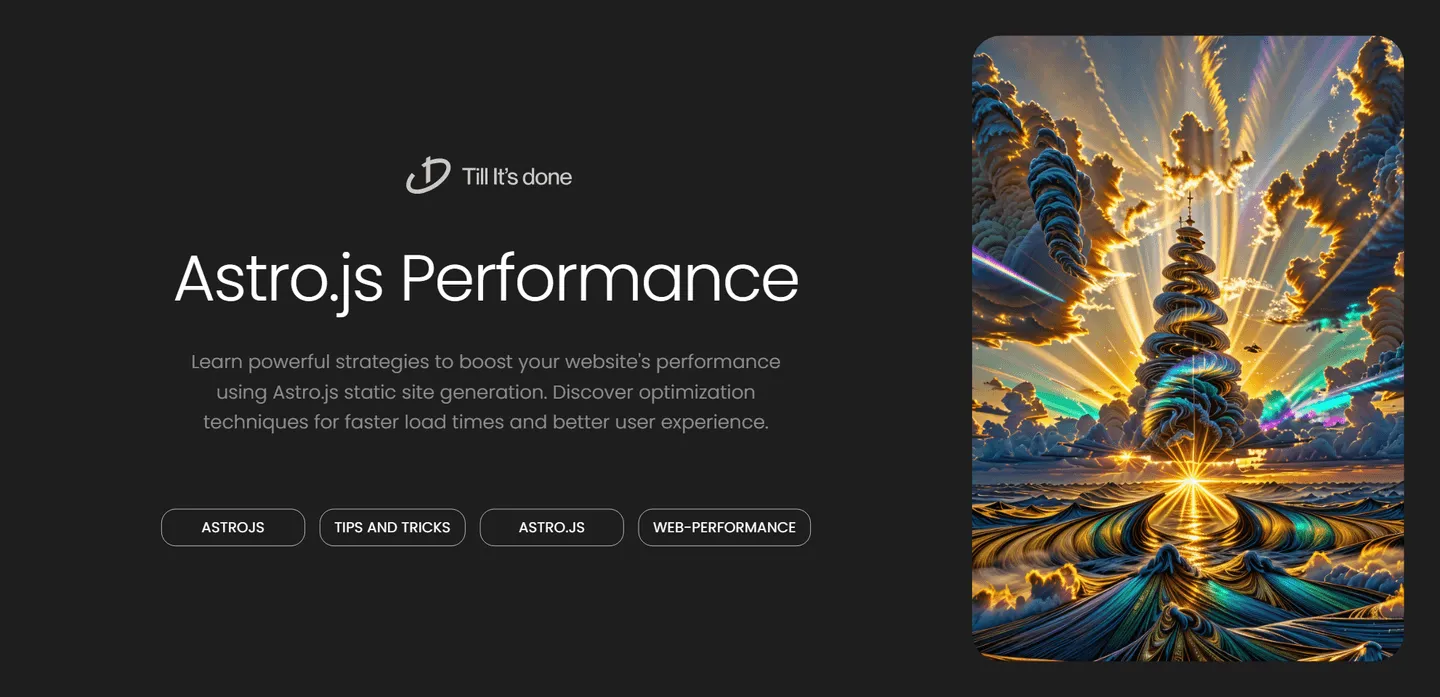- Services
- Case Studies
- Technologies
- NextJs development
- Flutter development
- NodeJs development
- ReactJs development
- About
- Contact
- Tools
- Blogs
- FAQ
Optimize Astro.js with Static Site Generation
Discover optimization techniques for faster load times and better user experience.

Optimizing Performance in Astro.js with Static Site Generation

As web development continues to evolve, performance optimization remains a crucial aspect of building modern websites. Astro.js has emerged as a game-changer in this space, offering powerful static site generation capabilities that can significantly boost your website’s performance. Let’s dive into some practical strategies to maximize the benefits of Astro.js’s static site generation.
Understanding Astro’s Static-First Approach
Astro.js takes a unique “static-first” approach to web development. By default, it generates static HTML during build time, eliminating the need for client-side JavaScript unless absolutely necessary. This approach, known as Zero JavaScript Runtime, results in lightning-fast page loads and improved SEO performance.

Advanced Optimization Techniques
1. Strategic Component Hydration
One of Astro’s most powerful features is its ability to control component hydration through directives. Instead of hydrating everything at once, you can use client directives like client:idle or client:visible to optimize when components load:
<InteractiveComponent client:visible /><HeavyComponent client:idle />This approach ensures that JavaScript only loads when it’s actually needed, keeping your initial page load blazing fast.
2. Asset Optimization
Images often constitute the largest portion of a website’s payload. Astro provides built-in image optimization capabilities that you can leverage:
import { Image } from '@astrojs/image';
<Image src={import('../assets/hero.png')} alt="Hero image" width={800} height={400} format="webp"/>
3. Implementing Partial Hydration
Partial hydration is a game-changing feature that allows you to keep most of your site static while selectively adding interactivity where needed. This helps maintain optimal performance while still providing dynamic functionality:
---import StaticHeader from '../components/StaticHeader.astro';import InteractiveCart from '../components/InteractiveCart.astro';---
<StaticHeader /><InteractiveCart client:idle />4. Build-time Data Fetching
Take advantage of Astro’s build-time data fetching to reduce server load and improve response times:
---const posts = await fetch('https://api.example.com/posts').then(r => r.json());---
<ul> {posts.map(post => <li>{post.title}</li>)}</ul>Performance Monitoring and Optimization
Remember to regularly monitor your site’s performance using tools like Lighthouse or WebPageTest. Astro makes it easy to maintain high performance scores, but it’s important to track metrics over time and identify areas for improvement.
Tips for ongoing optimization:
- Regularly audit your third-party dependencies
- Implement effective caching strategies
- Optimize fonts and icons
- Use responsive images and lazy loading
- Minimize CSS and JavaScript bundles
By following these optimization strategies, you can create blazing-fast websites with Astro.js that provide exceptional user experiences while maintaining developer productivity.

 สร้างเว็บไซต์ 1 เว็บ ต้องใช้งบเท่าไหร่? เจาะลึกทุกองค์ประกอบ website development cost อยากสร้างเว็บไซต์แต่ไม่มั่นใจในเรื่องของงบประมาณ อ่านสรุปเจาะลึกตั้งแต่ดีไซน์, ฟังก์ชัน และการดูแล พร้อมตัวอย่างงบจริงจาก Till it’s done ที่แผนชัด งบไม่บานปลายแน่นอน
สร้างเว็บไซต์ 1 เว็บ ต้องใช้งบเท่าไหร่? เจาะลึกทุกองค์ประกอบ website development cost อยากสร้างเว็บไซต์แต่ไม่มั่นใจในเรื่องของงบประมาณ อ่านสรุปเจาะลึกตั้งแต่ดีไซน์, ฟังก์ชัน และการดูแล พร้อมตัวอย่างงบจริงจาก Till it’s done ที่แผนชัด งบไม่บานปลายแน่นอน  Next.js สอน 14 ขั้นตอนเบื้องต้น: สร้างโปรเจกต์แรกใน 30 นาที เริ่มต้นกับ Next.js ใน 14 ขั้นตอนเพียงแค่ 30 นาที พร้อม SSR/SSG และ API Routes ด้วยตัวอย่างโค้ดง่าย ๆ อ่านต่อเพื่อสร้างโปรเจ็กต์แรกได้ทันทีที่นี่
Next.js สอน 14 ขั้นตอนเบื้องต้น: สร้างโปรเจกต์แรกใน 30 นาที เริ่มต้นกับ Next.js ใน 14 ขั้นตอนเพียงแค่ 30 นาที พร้อม SSR/SSG และ API Routes ด้วยตัวอย่างโค้ดง่าย ๆ อ่านต่อเพื่อสร้างโปรเจ็กต์แรกได้ทันทีที่นี่  วิธีสมัคร Apple Developer Account เพื่อนำแอปขึ้น App Store ทีละขั้นตอน อยากปล่อยแอปบน App Store ระดับโลก มาอ่านคู่มือสมัคร Apple Developer Account พร้อมเคล็ดลับ TestFlight และวิธีอัปโหลดที่ง่ายในบทความเดียวนี้ได้เลย
วิธีสมัคร Apple Developer Account เพื่อนำแอปขึ้น App Store ทีละขั้นตอน อยากปล่อยแอปบน App Store ระดับโลก มาอ่านคู่มือสมัคร Apple Developer Account พร้อมเคล็ดลับ TestFlight และวิธีอัปโหลดที่ง่ายในบทความเดียวนี้ได้เลย  TypeScript Interface คืออะไร? อธิบายพร้อมวิธีใช้และข้อแตกต่างจาก Type เรียนรู้วิธีใช้ TypeScript Interface เพื่อสร้างโครงสร้างข้อมูลที่ปลอดภัยและเข้าใจง่าย พร้อมเปรียบเทียบข้อดีข้อแตกต่างกับ Type ที่คุณต้องรู้ ถูกรวมเอาไว้ในบทความนี้แล้ว
TypeScript Interface คืออะไร? อธิบายพร้อมวิธีใช้และข้อแตกต่างจาก Type เรียนรู้วิธีใช้ TypeScript Interface เพื่อสร้างโครงสร้างข้อมูลที่ปลอดภัยและเข้าใจง่าย พร้อมเปรียบเทียบข้อดีข้อแตกต่างกับ Type ที่คุณต้องรู้ ถูกรวมเอาไว้ในบทความนี้แล้ว  Material-UI (MUI) คืออะไร อยากสร้าง UI สวยงามและเป็นมืออาชีพในเวลาอันรวดเร็วใช่ไหม มาทำความรู้จักกับ Material-UI (MUI) ที่ช่วยให้คุณพัฒนาแอปพลิเคชันบน React ได้ง่ายและดูดีในทุกอุปกรณ์
Material-UI (MUI) คืออะไร อยากสร้าง UI สวยงามและเป็นมืออาชีพในเวลาอันรวดเร็วใช่ไหม มาทำความรู้จักกับ Material-UI (MUI) ที่ช่วยให้คุณพัฒนาแอปพลิเคชันบน React ได้ง่ายและดูดีในทุกอุปกรณ์  เปรียบเทียบ 3 วิธีติดตั้ง install node js บน Ubuntu: NVM vs NodeSource vs Official Repo แบบไหนดีที่สุด? เรียนรู้วิธีติดตั้ง Node.js บน Ubuntu ด้วย NVM, NodeSource หรือ Official Repo เลือกวิธีที่เหมาะกับความต้องการของคุณ พร้อมเปรียบเทียบ เพื่อการพัฒนาที่มีประสิทธิภาพ!
เปรียบเทียบ 3 วิธีติดตั้ง install node js บน Ubuntu: NVM vs NodeSource vs Official Repo แบบไหนดีที่สุด? เรียนรู้วิธีติดตั้ง Node.js บน Ubuntu ด้วย NVM, NodeSource หรือ Official Repo เลือกวิธีที่เหมาะกับความต้องการของคุณ พร้อมเปรียบเทียบ เพื่อการพัฒนาที่มีประสิทธิภาพ! Talk with CEO
We'll be right here with you every step of the way.
We'll be here, prepared to commence this promising collaboration.
Whether you're curious about features, warranties, or shopping policies, we provide comprehensive answers to assist you.


